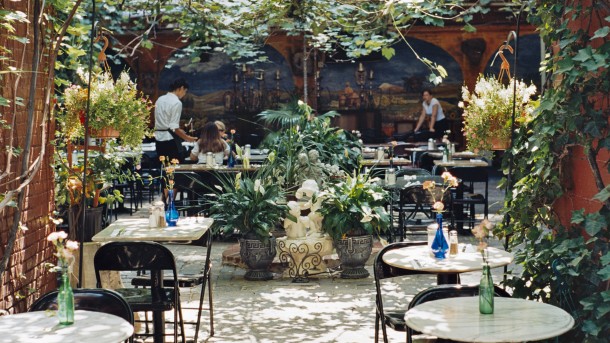Happy Moltmann Monday! I’ve chosen a passage from The Coming of God today in a section on “The End of Space in the Presence of God.” Now, I know talking philosophically about space (and/or time) is annoying for the vast majority of people, but fear not. Moltmann comes with metaphors, and they are lovely. They are also timely:
The experience of space is the experience of ‘being with another.’ A thing can only exist in something else, because nothing in the world can exist just of its own self. Every existence is inexistensia, ‘existence-in’… For human beings and mammals, the original experience of space is the experience of the fetus in the uterus. We grow nine months long ‘in’ the mother, then to be born and to experience the first pains of separation… But this context is important for the understanding of existence as ‘in-existence.’ It has a reference, not only to my existence in others, but also to the existence of others in me, as we see from the example of the mother, who becomes the physical world in which the child growing within her lives. Every human person exists in community with other people, and is also for them a living space. Every living thing is as the subject of its own life the object for other life as well. We are at once inhabitants and inhabited.
If in a community we take over responsibility for others, these others exist in a certain way in us, at least in our solicitude for them. That is why in Christian faith we say: because Christ is for us and gave himself for us, we are in Christ… In human community we mutually open up for each other the spaces of freedom through love, or we close them through intimidation.
All of creation is an act of God’s hospitality. If you believe it to be true in some way that we cannot have breath or life apart from God, then we live and move and have our being because God has created living space for us. But God has also created us to be living spaces for others. We deceive ourselves if we believe we walk around as our own entities, unaffected and unconnected to everyone and everything around us. No. We are here because God has made space for us. We literally live inside God’s grace. We share that grace with all the rest of creation. We are all mutually dependent upon God providing us this living space.
The question for those of us who follow God then becomes: what kind of living space are we creating for other people? If we were to envision our lives and relationships as a living room or a cafe, what would ours look like?
This year we have watched our fellow citizens battle and fight about rights and injustice and even inconveniences, in a number of contexts. I fear our American suburb mentality has spread to our hearts, and we keep to our own fences and garages and subdivisions without sharing any space with people who fall outside the purview of what we like, or value, or can tolerate. I worry that it’s making us lonely, anxious and angry. Worse, it’s making us weak disciples. Moltmann says we can mutually open up space for each other, space of freedom through love, or close them through intimidation.
I don’t know about you, but I’m tired of seeing intimidation win, in our nations, in our cities, in our homes, and in my own heart. What kind of living space are we creating for others?
For that matter, what kind of living space are we creating for ourselves? Does it develop life within us? Grace? The fruits of the Spirit?
We are here physically because a woman made room for us in her body. We are here more deeply because God has made room for us in God’s body. We are all under the grace of God’s canopy of life.
This week, I wonder if we can be more mindful of the ways we are living in the gracious space of God, and tend to our own living spaces as well.

Just: Thank You!
Gabriël, South Africa
Danielle, I just love your open admission that we all are dependent on God to provide us a living space in which we can mutually indwell one another. I thought your photo was a very inviting space that depicted the beauty and welcome of space/friendship where we enter into both the needs and strengths of the other person. Thanks for illustrating this opportunity we all have with each other in the triune God. Mark
Thanks to you both!
I love the image of making space for others. I used a garden metaphor (click through my name for more) — that we clear a space in our garden for another and work on nurturing that space together. There is still a fence around the garden. And there are boundaries within it which are expected to be followed. But the cleared space is always “ours”.